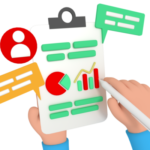AI (artificial intelligence) is changing almost every field, and schooling is no different. AI is changing how students learn and how teachers teach by giving them unique learning experiences and data-driven insights. When it is used in the classroom, it will make learning faster, more open, and more interesting.
This blog post will talk about the uses, benefits, and possible futures of AI in education, as well as how it is changing the way people learn today.
How AI Can Be Used in School
There are several ways that AI is being used in classes and online learning environments:
1. Learning That Fits Your Needs
AI makes sure that each student learns at their own pace and in the way that works best for them. Adaptive learning platforms watch how students do in real time and change the lessons to help students who are having trouble or to push students who are already good at it.
2. Computerized Systems for Teaching
Tutoring systems that use AI give students immediate feedback and step-by-step instructions. Like this, students can get help even when the school isn’t open.
3. Making Administrative Tasks Automatic
It takes teachers a lot of time to grade, take attendance, and make schedules. These boring jobs can be done automatically by AI tools, which gives teachers more time to teach and interact with their students.
4. Getting Students More Involved
Lessons are more fun when they use gamified learning tools, interactive simulations, and virtual helpers. Students get comments in real time, which keeps them motivated and helps them remember what they’ve learned.
5. Analyzing Data and Getting Insights
AI looks at data about students to find learning gaps, trends, and places where help is needed. Teachers can plan lessons and decide how to use resources by having all the information they need.
6. Inclusion and Accessibility
Speech-to-text, text-to-speech, and real-time translation tools are some of the ways that AI helps kids with challenges. It also gives students in rural or impoverished areas the chance to go to school.
Why AI Is Good for Education
Putting AI to use in schooling has many benefits, including:
- Personalized Learning: Learning that is tailored to each student helps them understand and remember more.
- Automation: Cuts down on the time needed for routine chores, which leads to higher efficiency.
- More Interest: Gamification and interactive tools make learning fun.
- Decisions Based on Data: Insights help teachers focus on the kids who need more help.
- Less Obstacles: AI tools take away obstacles for learners with disabilities or who live in remote places.
- Cost-Effectiveness Over Time: Streamlined processes and digital tools help keep costs down over time.

What the Future Holds for AI in Education
AI is becoming more and more useful in schooling. These are some new trends:
1. Virtual Schools and AI Teachers
AI will make virtual classes smarter so that students can talk to AI teachers at any time, from anywhere. This will give students more freedom in how they learn.
2. Analytics for Prediction
AI will be able to guess how well students will do in school, spot early signs of possible learning problems, and suggest ways to help students before the problems get worse.
3. Making Intelligent Content
AI can make quizzes, learning tools, and information that are specific to each student’s needs, which makes teachers’ jobs easier.
4. Learning Throughout Life and Improving Skills
AI will help people keep learning after school by providing personalized classes and tools for job growth.
5. Adding New Technologies to the Mix
Putting AI together with AR, VR, and game-like elements will make learning experiences that are fully immersing, fun, and effective.
Problems and Things to Think About
Artificial intelligence has a lot of perks, but it can be hard to use:
- Data Privacy and Security: Strong safeguards are needed when dealing with private school data.
- High Implementation Costs: Investing in training and infrastructure can cost a lot.
- Too Much Dependence on Technology: Interacting with other people is important for developing your social and mental skills.
- Concerns About Ethics: AI needs to be made so that it doesn’t use bias to give grades or suggest material.
To use AI to its fullest potential in education, these problems must be solved.
In Conclusion
AI is changing education by making it more personalized, increasing student involvement, increasing efficiency, and making it easier for students all over the world to get an education. With careful planning, AI can make schools better, more welcoming, and ready for the future.
More and more, AI-powered tools, smart teaching systems, and prediction analytics will be used in the future of education to make sure that every student has the help and tools they need to succeed.
Check out Edument Online School to learn more about online schooling.


















